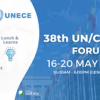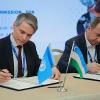News
Displaying Results 26 - 50 of 84
The transition from linear to circular economies requires fundamental rethinking of trade policies and regulations. “Harmonized System” codes (HS codes) are a key pillar of the tariff infrastructure for international trade. These HS codes were designed at a time when circular economy considerations…
The global economy must be urgently steered away from unsustainable production and consumption patterns, which fuel the climate crisis, deplete natural resources and negatively impact both people and the environment. Global value chains are predominantly linear in nature, and the lack of…
Standards are in everything that surround us. Just the mobile phone in your pocket uses hundreds of standards, from the cellular network and the cable connectivity to physical elements such as the processing chips and the LED screen, not to mention security testing and the process design. We rely…
Addressing the triple planetary crisis of climate disruption, pollution and nature loss, requires an innovative approach to financing as a way to rapidly and systemically address these interlinked issues. Public-Private Partnerships (PPPs) offers a financing mechanisms for infrastructure projects…
Meeting the goals of the UN Agenda 2030 for Sustainable Development and overcoming the challenges of sluggish economic growth, social exclusion and environmental degradation requires the contribution of both men and women. More-over, many sustainable development challenges affect women more…
Governments, Mayors, leading architects, urbanists and experts will gather in San Marino on 3-6 October 2022 for the 83rd session of the UNECE Committee on Urban Development, Housing and Land Management. The session will support regional exchange of experiences and good practices to promote…
SPECA countries are facing unique challenges, stemming from at least three crises: the need to deal with the regional and global repercussions of the COVID-19 pandemic, the political upheaval in Afghanistan, and the conflict in Ukraine. With the correct policies and mechanisms for subregional…
Circular economy transformation is a new area of cooperation between the United Nations Economic Commission for Europe (UNECE) and the Government of Tajikistan. Under the overarching leadership of the Ministry of Economic Development and Trade, UNECE together with the UN Tajikistan, and in…
World trade continues to be severely affected by global supply chain disruptions, exacerbated by shocks including the ongoing Covid-19 pandemic and the war in Ukraine. These challenges attest to the value of supporting and reinforcing trade facilitation measures to enhance resilience in all regions…
In the past few years, multiple shocks ranging from pandemics to conflicts have restricted the movement of goods and services, resulting in the number of countries facing significant disruptions in supply chains is increasing every year, affecting timely delivery of essential goods, such as food…
In June 2022, the World Trade Organization (WTO) Members agreed on the Ministerial Outcome Document, which marked for the first time the recognition of the importance of the multilateral trading system in addressing the triple global environmental crises of climate change and related natural…
With blockchain opening up many avenues in international trade – from facilitating financing and customs procedures to tracking due diligence and sustainability compliance – countries and companies are looking for successful practices to scale up their efforts to maximize the potential of this new…
UNECE and partners train 17 Sub-Saharan African Countries on the TIR/ eTIR and CMR /eCMR Conventions
UNECE teamed up with the Islamic Center for the Development of Trade (ICDT) and the Islamic Development Bank (IsDB) to organize a training workshop on International Road and Goods Transport Conventions for executives of the Ministries of Trade and Customs Administrations of 17 member countries of…
July is a month to start enjoying the harvest of fruits and vegetables for many in Europe and the topic of reducing food loss and waste becomes very urgent. In Serbia, agriculture is an important sector of the economy, contributing around 6% of GDP. In March 2022 food production accounted for 10.4…
In view of the upcoming COP 27 of the UNFCCC, taking place in Egypt later this year, the growing threats on climate created by the textile and leather sectors call for our urgent action. If we continue down this path, we will fail by 50% to meet our 2030 emissions reduction targets, resulting in…
UNECE is supporting the Government of Moldova in its efforts to enhance its national innovation system to accelerate progress towards Sustainable Development. During the online meeting on 16 June, the two sides agreed to develop a Roadmap for Innovation and Technology Transfer, which will feed into…
The UNECE region is not on track to meet the Sustainable Development Goals (SDGs) by 2030. Public procurement can be a powerful policy lever to accelerate progress. Some Governments in the UNECE region spend as much as 20 percent of GDP annually on procuring goods, services, and infrastructure.…
The third online meeting on the new Master Plan for Kharkiv on 28 May 2022 saw a group of local architects join the discussions led by the Norman Foster Foundation and the City Government of Kharkiv. Mayor of Kharkiv Ihor Terekhov spoke of his vision to transform the city to become a great…
UNECE was engaged at the main global forum to assess and discuss progress in implementing the Sendai Framework for Disaster Risk Reduction (DRR) – the seventh session of the Global Platform for Disaster Risk Reduction (GP2022) held in Bali and online, 25-27 May 2022, fully embracing its theme: “…
Products today are integrating more and more advanced technologies and sustainability criteria into their design. Soft toys with computer chips, medical devices that can assist in operations and learn from past uses, repurposed plastic bottles assembled to form a new, different product… each pose…
Standards are an integral part of society and are present in nearly everything that surrounds us on a daily basis; they shape how products are designed, produced and used. They are in all products that cross borders and can play a key role to reduce technical barriers to trade as well as integrate…
Recent disruptions of supply chains have exposed fragilities in the current trading system and brought to light the importance of resilience and transparency in global trade.
UNECE and other international organizations play a crucial role in supporting countries (including both the public and…
As an established convenor of standards developing organisations, UNECE encourages the integration of a gender perspective, providing practical steps for organisations to advance women’s full and effective participation in standards and standards development. With the objective of strengthening…
The textile industry is a key driver of Uzbekistan’s economy, reflected in the country’s rank as sixth largest cotton producer in the world. In 2021, the country accelerated the battle against its child and forced labor violations in cotton harvest according to a new International Labour…
New multilateralism, focused on creating synergies between local, national, regional and global efforts, combined with practical, forward-looking solutions are needed to address the pressing challenges facing cities across the globe, including the coronavirus pandemic, rapid urbanization, and…


























